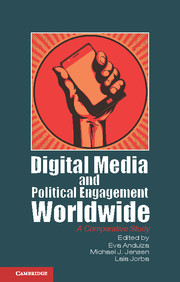Book contents
- Frontmatter
- Contents
- List of Tables and Figures
- Contributors
- Acknowledgments
- Introduction
- 1 The Impact of Digital Media on Citizenship from a Global Perspective
- 2 Recent Shifts in the Relationship between the Internet and Democratic Engagement in Britain and the United States
- 3 Political Engagement and the Internet in the 2008 U.S. Presidential Elections
- 4 Online Political Participation in the United States and Spain
- 5 Internet Use and Political Attitudes in Europe
- 6 Digital Media and Offline Political Participation in Spain
- 7 Online Participation in Italy
- 8 On the Causal Nature of the Relationship between Internet Access and Political Engagement
- 9 The Uses of Digital Media for Contentious Politics in Latin America
- 10 Opening Closed Regimes
- 11 Digital Media and Political Attitudes in China
- Conclusion
- References
- Index
6 - Digital Media and Offline Political Participation in Spain
Published online by Cambridge University Press: 05 July 2012
- Frontmatter
- Contents
- List of Tables and Figures
- Contributors
- Acknowledgments
- Introduction
- 1 The Impact of Digital Media on Citizenship from a Global Perspective
- 2 Recent Shifts in the Relationship between the Internet and Democratic Engagement in Britain and the United States
- 3 Political Engagement and the Internet in the 2008 U.S. Presidential Elections
- 4 Online Political Participation in the United States and Spain
- 5 Internet Use and Political Attitudes in Europe
- 6 Digital Media and Offline Political Participation in Spain
- 7 Online Participation in Italy
- 8 On the Causal Nature of the Relationship between Internet Access and Political Engagement
- 9 The Uses of Digital Media for Contentious Politics in Latin America
- 10 Opening Closed Regimes
- 11 Digital Media and Political Attitudes in China
- Conclusion
- References
- Index
Summary
Introduction
The literature on the impact of digital media use on political behavior has debated whether the internet has a positive or a negative effect on citizens’ political engagement. Among those defending a positive effect, the reinforcement hypothesis argues that digital media offer new opportunities for those who were already participating before securing their access to the internet (Hill and Hughes 1998; Norris 2000; Weber, Loumakis, and Bergman 2003; Curtice and Norris 2004). In contrast, the mobilization hypothesis supports the idea that digital media will contribute to a more participative society by attracting previously less active members of the public (DelliCarpini 2000; Ward, Gibson, and Lusoli 2003; Tolbert and McNeal 2003; Stanley and Weare 2004).
This chapter addresses this question by taking into account the multidimensional character of political participation. Internet use may have an impact on specific forms of political participation and not on others. We analyze political participation, distinguishing between representational and extrarepresentational activities (Teorell, Torcal, and Montero 2007). The representational mode includes formal activities conducted in the frame of institutional rules and procedures typical of representative democracy (e.g., party-oriented activities, voting, contacting an official), whereas extrarepresentational conduct includes informal activities such as protest and newer forms of political consumerism. Although the former have decreased in recent decades across most industrial countries, the latter are increasing.
- Type
- Chapter
- Information
- Digital Media and Political Engagement WorldwideA Comparative Study, pp. 118 - 137Publisher: Cambridge University PressPrint publication year: 2012
- 5
- Cited by



